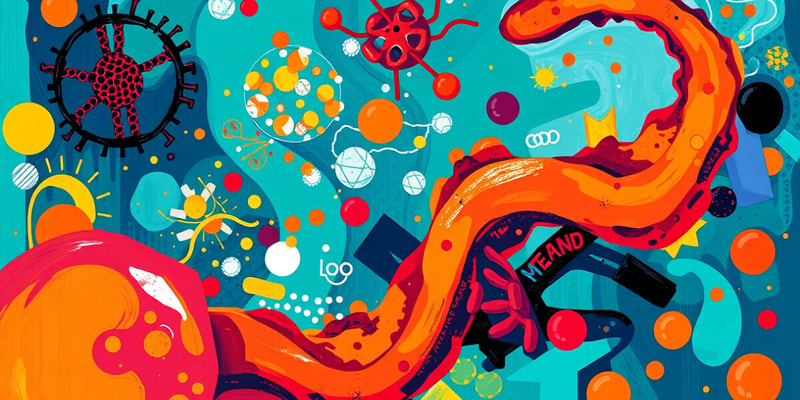Podcast
Questions and Answers
What role does the liver play in drug metabolism?
What role does the liver play in drug metabolism?
How does the kidney contribute to drug excretion?
How does the kidney contribute to drug excretion?
What is the therapeutic effect of a medication?
What is the therapeutic effect of a medication?
What are side effects in the context of medication?
What are side effects in the context of medication?
Signup and view all the answers
What defines an adverse effect of medication?
What defines an adverse effect of medication?
Signup and view all the answers
What is the requirement for obtaining drugs that are controlled by law?
What is the requirement for obtaining drugs that are controlled by law?
Signup and view all the answers
Why might clients stop taking their medication?
Why might clients stop taking their medication?
Signup and view all the answers
What must be included in the special register for administering dangerous drugs?
What must be included in the special register for administering dangerous drugs?
Signup and view all the answers
What is a common characteristic of a cupboard used to store dangerous drugs?
What is a common characteristic of a cupboard used to store dangerous drugs?
Signup and view all the answers
What can happen if a side effect negates medication's therapeutic action?
What can happen if a side effect negates medication's therapeutic action?
Signup and view all the answers
Which statement about medication response is true?
Which statement about medication response is true?
Signup and view all the answers
Who is responsible for holding the key to the cupboard where dangerous drugs are stored?
Who is responsible for holding the key to the cupboard where dangerous drugs are stored?
Signup and view all the answers
Which of the following substances is classified as a dangerous drug?
Which of the following substances is classified as a dangerous drug?
Signup and view all the answers
What happens to the drug package before administration?
What happens to the drug package before administration?
Signup and view all the answers
What is a critical step before administering a dangerous drug?
What is a critical step before administering a dangerous drug?
Signup and view all the answers
Why are some drugs designated as dangerous?
Why are some drugs designated as dangerous?
Signup and view all the answers
What is required for the renewal of supplies of dangerous drugs?
What is required for the renewal of supplies of dangerous drugs?
Signup and view all the answers
How frequently should the hospital pharmacist check the contents of the cupboard?
How frequently should the hospital pharmacist check the contents of the cupboard?
Signup and view all the answers
What must be included on a prescription for dangerous drugs?
What must be included on a prescription for dangerous drugs?
Signup and view all the answers
What should be done if there is an alteration in the appearance of a drug?
What should be done if there is an alteration in the appearance of a drug?
Signup and view all the answers
Why should the stoppered bottle fit securely?
Why should the stoppered bottle fit securely?
Signup and view all the answers
How should bottles be organized in the cupboard?
How should bottles be organized in the cupboard?
Signup and view all the answers
What is the correct procedure for carrying poison to a patient?
What is the correct procedure for carrying poison to a patient?
Signup and view all the answers
What responsibility does the nurse-in-charge have regarding dangerous drugs?
What responsibility does the nurse-in-charge have regarding dangerous drugs?
Signup and view all the answers
What is the primary focus of rehabilitation nursing?
What is the primary focus of rehabilitation nursing?
Signup and view all the answers
Which of the following is NOT mentioned as a topic covered in informative and social events?
Which of the following is NOT mentioned as a topic covered in informative and social events?
Signup and view all the answers
What is an essential skill that rehabilitation nurses possess?
What is an essential skill that rehabilitation nurses possess?
Signup and view all the answers
Which seasonal activity is designed to help keep patients’ minds and bodies active?
Which seasonal activity is designed to help keep patients’ minds and bodies active?
Signup and view all the answers
How do rehabilitation nurses contribute to the healing journey of their patients?
How do rehabilitation nurses contribute to the healing journey of their patients?
Signup and view all the answers
What is the purpose of the forums, talks, and seminars hosted by Vintersol?
What is the purpose of the forums, talks, and seminars hosted by Vintersol?
Signup and view all the answers
What is the main goal of the rehabilitation process mentioned?
What is the main goal of the rehabilitation process mentioned?
Signup and view all the answers
Which of the following elements is emphasized in the rehabilitation process at Vintersol?
Which of the following elements is emphasized in the rehabilitation process at Vintersol?
Signup and view all the answers
What is the primary purpose of inpatient rehabilitation therapy?
What is the primary purpose of inpatient rehabilitation therapy?
Signup and view all the answers
Which of the following is NOT typically a focus of physical therapy?
Which of the following is NOT typically a focus of physical therapy?
Signup and view all the answers
Which treatment technique is used in both inpatient and outpatient rehabilitation?
Which treatment technique is used in both inpatient and outpatient rehabilitation?
Signup and view all the answers
Outpatient rehabilitation centers are often focused on treating which of the following conditions?
Outpatient rehabilitation centers are often focused on treating which of the following conditions?
Signup and view all the answers
What role do physical therapists play in managing chronic conditions?
What role do physical therapists play in managing chronic conditions?
Signup and view all the answers
Which statement is true about outpatient rehabilitation therapy?
Which statement is true about outpatient rehabilitation therapy?
Signup and view all the answers
What is a typical first step taken by a physical therapist when treating a patient?
What is a typical first step taken by a physical therapist when treating a patient?
Signup and view all the answers
Which of the following therapies is considered a part of occupational therapy?
Which of the following therapies is considered a part of occupational therapy?
Signup and view all the answers
Study Notes
Volume of Distribution
- Volume of distribution measures how extensively a drug disperses throughout body tissues compared to plasma.
Metabolism and Excretion
- Metabolism involves the body's process of chemically altering drugs for elimination.
- The liver is critical in drug metabolism and excretion; liver diseases can impede drug processing.
- Kidneys primarily handle drug excretion; higher water solubility aids renal excretion of drugs.
Medication Actions
- Medication actions vary widely and depend on factors including characteristics and client responses.
- Nurses must comprehend all potential effects of medications on patients.
Therapeutic Effects
- Therapeutic effects are desired psychological responses to medications.
- Each drug has specific outcomes; e.g., nitroglycerine reduces cardiac workload, while aspirin offers analgesic, anti-inflammatory, and antipyretic benefits.
Side Effects
- Side effects are unintentional secondary effects caused by medications, which may be harmless or harmful.
- Serious side effects can lead to discontinuation of the medication; patients often cease use due to side effects.
Adverse Effects
- Adverse effects are severe, often unexpected responses to medications, sometimes requiring immediate cessation of the drug.
Drug Storage and Control
- Controlled medications require a written prescription for public access and must be stored in locked cabinets marked accordingly.
- Dangerous drugs include opium, morphine, and cocaine, which are subject to strict regulations.
Control of Dangerous Drugs
- Hospitals implement stringent control measures for dangerous drugs, including strict storage protocols and documentation.
- Each dosage given must be recorded with specific details about the patient, drug, prescriber, and administering personnel.
General Care for Drug Containers
- Drug containers should be clearly labelled and organized.
- Ensure stoppers fit securely on bottles to prevent evaporation or degradation of medications.
- Maintain locked storage to prevent unauthorized access.
Rehabilitation Therapy
- Inpatient therapy is conducted within hospitals for severe conditions; outpatient therapy occurs outside hospital settings.
- Rehabilitation may include various therapies such as physical, occupational, and speech therapy.
Physical Therapy
- Aimed at improving pain, mobility, and function post-injury or surgery.
- Therapists develop individualized plans based on assessments of mobility, balance, and strength.
Rehabilitation Nursing
- Focuses on holistic care addressing medical, environmental, and spiritual needs of patients with chronic conditions.
- Nurses foster patient independence, confidence, and optimal health through personalized care.
Seasonal Group Classes and Activities
- Group activities provide opportunities to learn skills and promote physical and mental engagement.
- Topics include nutrition, daily living aids, and various therapeutic methods, enhancing patient knowledge and well-being.
Studying That Suits You
Use AI to generate personalized quizzes and flashcards to suit your learning preferences.
Related Documents
Description
This quiz covers key concepts from Pharmacology Chapter 5, focusing on the volume of distribution, metabolism, and excretion of drugs. Additionally, it explores medication actions, therapeutic effects, and side effects relevant to nursing practice. Test your understanding of how drugs interact within the body and their impacts on patient care.





